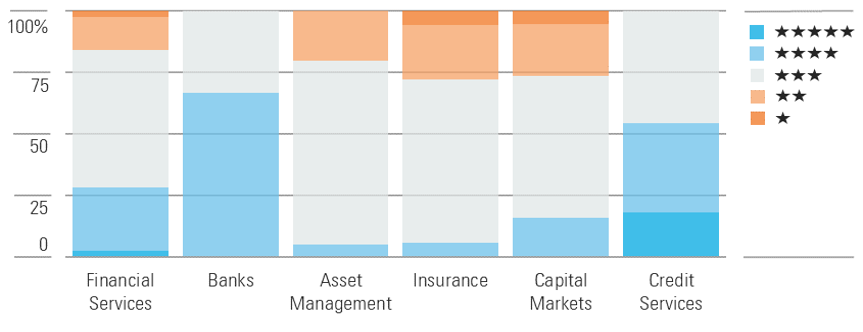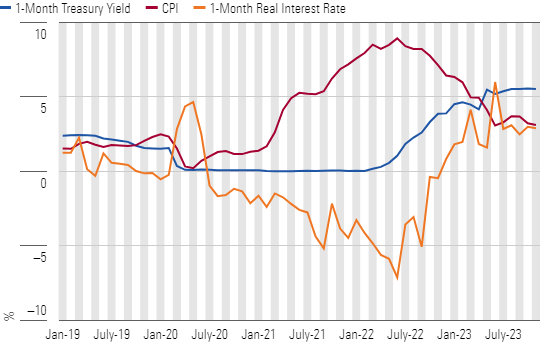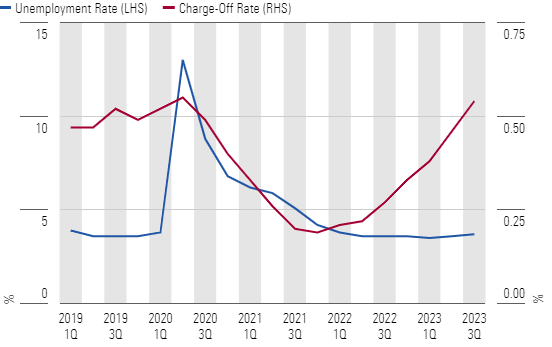Financial Services: After Recent Gains, Pockets of Undervalued Companies Remain
We recommend Charles Schwab, Wells Fargo, and PayPal in this space.

The median North American financial sector stock trades at a 2% discount to its fair value estimate, compared with the 12% discount at the end of the third quarter of 2023. We currently rate around 30% of the North American financial sector stocks that we cover as undervalued, while about 15% are rated overvalued.
Our top picks among financial services stocks are:
Financial Sector Boosted by Lower Interest Rates

At the Federal Reserve’s Open Market Committee meeting in December, participants maintained the central bank’s target range for the federal-funds rate at 5.25%-5.50% and decreased their median assessment of the federal-funds rate at the end of 2024 to 4.6% from 5.1%. One of the narratives in the market is that the Fed should lower nominal interest rates as inflation cools to keep the real interest rate from climbing because a higher real interest rate would increase the probability of a recession.
We Still See the Most Value In Banks and Credit Services

2024 will likely be an interesting year for financials. Lower interest rates will have varying effects on banks and other companies in this sector, depending on the net effect of lower funding costs compared with the pressure that interest-earning assets have on yields. Lower interest rates could also stem the flow of cash from low-yielding deposits into higher-yielding CDs and money market funds. Financial asset prices have recovered on the prospect of lower interest rates, which has improved the capital position of many financial companies as unrealized losses on balance sheets from fixed-income securities diminish, and has also increased the earnings power of asset and wealth management firms.
Managing Real Interest Rates Is a Focus for the Federal Reserve

While the market is increasingly adopting the view that the U.S. economy will experience a soft landing, that doesn’t mean everything is stable or improving. FOMC participants are still forecasting the unemployment rate to increase to 4.1% in 2024 from 3.7% in November 2023. The charge-off rate on loans at commercial banks has also been increasing. While our base case is for a relatively stable economy and improving earnings for the financial sector, the lagged effect that tighter monetary policy during previous quarters will have on the economy remains a risk.
Unemployment and Charge-Offs Are Still Rising

Top Financial Services Sector Picks
Charles Schwab
- Fair Value Estimate: $80.00
- Morningstar Rating: 3 stars
- Morningstar Economic Moat Rating: Wide
- Morningstar Uncertainty Rating: High
Charles Schwab is a fundamentally strong company that has sold off due to headline risks and earnings headwinds that are reversing. The recent decline in U.S. interest rates will decrease the company’s unrealized loss position on its U.S. Treasury and agency mortgage-backed securities holdings, which will improve the company’s capital position. In the next couple of quarters, we expect the firm to pay down increasing amounts of its high-cost borrowings, which will boost its net interest income and earnings.
Wells Fargo
- Fair Value Estimate: $55.00
- Morningstar Rating: 4 stars
- Morningstar Economic Moat Rating: Wide
- Morningstar Uncertainty Rating: Medium
While Citigroup C is a bit cheaper than Wells Fargo overall, we like that Wells has a stronger franchise from a profitability perspective and that it’s further along in its turnaround. Given the potential timelines at play and the difficulties that come with franchises like Citigroup, which are structurally less profitable than peers, we would favor Wells today. Wells is also not dealing with the same capital or earnings pressure issues that many regionals are dealing with, lowering its rate risk exposure. While the timing is always difficult to know, the bank could have a positive regulatory catalyst in 2024, and it seems to be setting up for outperformance on net interest income. The regulatory timeline and further banking sector stress remain important risks to consider.
PayPal Holdings
- Fair Value Estimate: $135.00
- Morningstar Rating: 5 stars
- Morningstar Economic Moat Rating: Narrow
- Morningstar Uncertainty Rating: High
PayPal’s shares have since fallen about 80% from their pandemic peak to a level materially below their prepandemic price. With market confidence in the stock at a low ebb, we see a potentially good long-term opportunity. While we recognize the headwinds PayPal faces in the near term, in the long term, the company’s fate remains tied to the high-growth e-commerce space, with Venmo providing some additional upside option value. Historically, PayPal has demonstrated it can take share in this area, and we think it continues to do so on an overall basis. We believe the company retains a strong competitive position.
Top Financial Services Sector Picks Performance
The author or authors do not own shares in any securities mentioned in this article. Find out about Morningstar’s editorial policies.

/s3.amazonaws.com/arc-authors/morningstar/75bbf764-3b6f-4f5a-8675-8f9488c74c04.jpg)
/cloudfront-us-east-1.images.arcpublishing.com/morningstar/347BSP2KJNBCLKVD7DGXSFLDLU.jpg)
/cloudfront-us-east-1.images.arcpublishing.com/morningstar/TP6GAISC4JE65KVOI3YEE34HGU.jpg)
/d10o6nnig0wrdw.cloudfront.net/04-29-2024/t_d0e8253d77de4af9ae68caf7e502e1bf_name_file_960x540_1600_v4_.jpg)
:quality(80)/s3.amazonaws.com/arc-authors/morningstar/75bbf764-3b6f-4f5a-8675-8f9488c74c04.jpg)